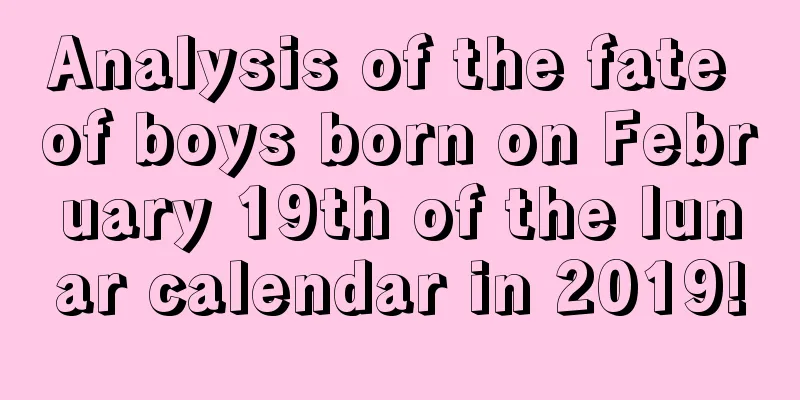How do various folk customs celebrate the third day of the third lunar month? What are their respective customs?

Introduction: March 3rd is an important festival for many people of different nationalities. So how do different folks celebrate March 3rd in the lunar calendar and what are their respective customs? In the third month of the lunar calendar, the weather gradually becomes warmer. Embracing the warmth of spring, the whole earth is full of vitality. Shuimoxiansheng.com will interpret every day of the third month of the lunar calendar in 2019 for you!How do various folk customs celebrate the third day of the third lunar month? What are their respective customs?Analysis of customs of different ethnic groups on March 3: HanMarch 3rd, known as Shangsi Festival in ancient times, is a festival to commemorate Emperor Huangdi. According to legend, March 3rd is the birthday of Emperor Huangdi. There is a saying in ancient China that "On February 2nd, the dragon raises its head; on March 3rd, Xuanyuan is born." After the Wei and Jin Dynasties, the Shangsi Festival was changed to March 3rd, and it was inherited by later generations, thus becoming a festival for the Han people to feast by the water and outing in the suburbs in spring. The Han nationality has the custom of eating shepherd's purse boiled eggs. On that day, people would engage in activities such as flowing cups, flowing eggs, flowing dates, begging for children, wearing willow wreaths, visiting spring, outing, eating clear rice and singing parties. The Han people celebrate the March 3rd Festival. In addition to offering sacrifices, the festival has gradually developed into other folk activities such as playing by the river, meeting men and women, planting willows and appreciating flowers. Analysis of customs of different ethnic groups on March 3: Zhuang The third day of the third lunar month is a grand festival for the Zhuang people. It is said to be a festival to commemorate the Zhuang singing fairy Liu Sanjie, so it is also called the Singing Fairy Festival. On March 3rd, people go to singing fairs, set up singing tents and hold singing parties, where young men and women sing songs, tap eggs, throw embroidered balls and talk about love. The Zhuang ethnic group often visits graves on March 3rd and usually steams five-color glutinous rice on that day. The singing festival usually opens with folk songs, showing the cultural customs of people who are good at singing and dancing. Thousands of people dance the bamboo pole dance together. Each square has the characteristics of Zhuang. People hold five-color glutinous rice, hold Zhuang wine, carry hoes for work, and hold exquisite winnowing baskets in their hands. Analysis of customs of different ethnic groups on March 3: She Nationality March 3rd is considered the birthday of rice, and every family eats black rice. It is said that among the She people, March 3rd is an important festival that can be compared with the Spring Festival. On this day, every family slaughters animals and offers sacrifices to their ancestors. Many families often choose this day to hold their wedding. Eat black rice during festivals. When night falls, a bonfire party is held and people compete in singing. According to legend, during the Tang Dynasty, the She ethnic group hero Lei Wanxing led people of all ethnic groups in an uprising and was trapped in the mountains during a battle. Due to lack of food and fodder, the rebel army was on the verge of being wiped out. They relied on eating a kind of wild fruit called "Wunanzi" to fill their stomachs. They persisted for several months and broke out of the encirclement on the "March 3rd" of the following year, turning defeat into victory. In order to commemorate these She heroes, the She people eat "black rice" as a memorial on the third day of March every year. The period around March 3rd is the time for spring ploughing, so eating black rice also means praying for a good harvest. Analysis of customs of different ethnic groups on March 3: Miao "March 3rd" is also known as the "Onion Picking Festival". It evolved from the ancient love festival of young men and women of the Miao ethnic group. It is said that every March 3rd day, men and women gather together on the hillside in the name of picking wild onions and show their love to each other. They talk and sing Miao songs while picking wild onions. This custom has continued to this day. On this day, Miao girls dress up and come to a fixed place to show off their beauty. The young men are also waiting for this day. They have the opportunity to meet many girls and sing with them. If they like each other, they can be taken home immediately. So after the concert, you can see a lot of men and women hustling each other. Analysis of the customs of different ethnic groups on March 3: Buyi people The Buyi people in Xinbao Township, Wudang District, Guiyang City call "March 3" "Sacrificing to the Earth Silkworm". In order to protect their crops and strive for a good harvest, the Buyi people in this area use fried corn flowers as offerings on the third day of March every year. They go to the nearby hillsides in groups of three or five to worship the "God of Heaven and Silkworms", praying to the God of Heaven to protect them and prevent the silkworms from killing the crops in the fields, so that the crops will be abundant. After the sacrifice, people walked along the ridges beside the fields, singing folk songs and scattering corn flowers on the soil. In the northern Bawang River area, due to the relatively low temperature, the maple leaves are still small and have not yet colored, so March 13th is celebrated as the "Maple Leaf Festival." On this day of the festival, people go to the mountains and fields to enjoy the spring. Children pick young maple leaves and make them into balls to throw, while women pick a few young maple leaves and insert them in their hair buns. In addition, every family dyes glutinous rice into various colors and makes flower glutinous rice to eat. The young people went to the hillside to blow wood leaves and sing folk songs. If they meet a suitable opponent, they will invite him to the Buyi village at night and sing songs all night long. Before leaving, the host wrapped glutinous rice and chicken legs in banana leaves and gave them to the singers as festival gifts. Analysis of customs of different ethnic groups on March 3: Dong people According to the Dong legend, in ancient times, the original territory of the Dong people always regarded the rice planting festival as the time when the tung trees bloomed. But one year the tung trees did not bloom, and as a result the farming season was missed, the people had to flee to Baojing area. In order to learn from the past lessons, every March 3rd day people play the reed pipe and sing, visit relatives and friends, and remind each other to busy themselves with farming. The Dong people often hold activities such as grabbing fireworks, bullfighting, horse fighting, singing, and stepping on the hall during festivals, which is also called the "Fireworks and Firecrackers Festival." Early in the morning, the girls would go to the vegetable garden to pick half a basket of vegetables, wash them, dress up, and gather under the Moga tree. The young men waiting there would wait for an opportunity to ask their ideal girl for the basket. The one who got the basket would agree with the girl on a date to return the basket, and would give her fruits and cloth in return. Once upon a time there was a young man and woman in love, and the girl's mother promised her to a wealthy businessman, and they were scheduled to get married on the fourth day of March. On the third day of the Chinese New Year, the couple in love jumped into the pond under the Moga tree, filled with grief and anger, to commit suicide. To commemorate them, local young people come here on March 3rd every year to play the sheng and sing songs, breaking free from the shackles of arranged marriages. Analysis of the customs of different ethnic groups on March 3: Yao people "March 3rd" is also known as the "Ganba Festival". Before "March 3rd" every year, Yao men go to the old forest a week in advance to hunt and kill wild animals, go to the river to catch fish and shrimps, and roast them into dry food to take home. Women went up the mountain to pick indigo leaves and other natural dyes, boiled them in water and dyed them into glutinous rice in four colors: red, yellow, blue and purple. This tradition was passed down year after year to this day. The Yao ethnic group also regards March 3rd as a singing festival. In addition to singing preface songs, tea songs, and dispersion songs, they also sing songs of complaining and songs of thanking the immortals, but rarely sing love songs. When eating and drinking, wine, tea and the like are indispensable. Which ethnic group’s festival is March 3rd? In addition to the ethnic groups mentioned above, some other ethnic minorities also celebrate March 3rd. Let’s take a look. Analysis of customs of different ethnic groups on March 3: Tujia March 3rd of the Tujia ethnic group is their Valentine's Day. On the third day of March, brothers and sisters of the Tujia ethnic group gather together, sing folk songs as a matchmaker, and engage in marriage by stepping on each other's feet. The Tu ethnic group's traditional festival, the Egg Festival, is held on the third day, eighth day or eighteenth day of the third lunar month every year, depending on the location. At that time, sacrificial animals would be offered as thanksgiving in the temples, and monks would be invited to chant scriptures and perform dances to thank the gods in order to ward off disasters and ensure a good harvest and prosperity for both people and livestock. The participants also brought many cooked eggs with them, one for eating themselves, and the other for hitting each other as a joke. Analysis of customs of different ethnic groups on March 3: Li Nationality March 3rd is the traditional picnic festival of the Li ethnic group. According to legend, during the flood period, Tianfei and her sister Guanyin wandered in the Wuzhi Mountain area and survived. In order to continue the family line, the sister tattooed patterns on her face so that her brother could not be recognized. They became a couple, had children, and worked hard to make Wuzhi Mountain prosperous. Since then, every March 3rd, Li youths bring bamboo tubes of fragrant rice and colorful umbrellas to the Wuzhi Mountain to welcome the spring. On the third day of the third lunar month, the Li people from various villages gather in the wilderness, carrying Shanlan rice wine and bamboo tube rice, and hold activities with rich folk customs and practices, such as powder gun shooting and archery competitions, and singing duets and bamboo pole dances by middle-aged and elderly Li men and women. At that time, you can also see young men and women in pairs engaging in "mountain love", a unique way of love. The new wave of annual fortune in 2019 has already changed. Calculate your own fortune in advance, correct your mistakes if there are any, and encourage yourself if there are none, so that the new year will be smooth and safe. To calculate your new fortune in 2019, please click on the [Premium Calculation] below to learn about your new fortune. I wish you peace and happiness in the new year! |
>>: Is April Fool's Day, April 1, 2019, a suitable day for repairing or relocating graves?
Recommend
What is the five elements of the twelfth day of the first lunar month in 2019? What are the customs?
In the first month of the lunar year, every day ha...
Can I move to a new home during the Lantern Festival in 2022? Is it an auspicious day for moving?
The rise of the custom of lighting lanterns on the...
Is it suitable to get a haircut on the fourth day of the sixth lunar month in 2021? What should I pay attention to when going to a barber shop?
The sixth month of the lunar calendar is when lotu...
Is December 5, 2019 a suitable day to open a business?
Is December 5, 2019 a suitable day to open a busi...
Is May 21, 2019, the Grain Full Festival, a suitable day for engagement? Is it auspicious to get engaged on Grain Full Festival?
Introduction: In our country’s traditional culture...
What day is July 21st in the lunar calendar 2018? What month and date is it?
It is the seventh month of the lunar calendar in ...
Query the position of the God of Happiness on the 30th day of the eighth lunar month in 2019!
The God of Joy can bring us harmony, happiness an...
Can I pick up a new car on July 19th of the lunar calendar in 2020?
Can I pick up a new car on July 19th of the lunar...
Is the 16th day of the leap April 2020 an auspicious day? Check the lucky position of the God of Wealth today
Introduction: Every day will have good and bad luc...
Is it okay to hold the funeral on October 24th of the lunar calendar in 2017?
We are excited about the birth of new life, but we...
List of boy names with the surname Li in 2018
Many parents feel confused when naming their child...
Is it suitable to get a haircut on November 19, 2019 in the lunar calendar? What is the fortune today?
Is it suitable to get a haircut on November 19, 20...
Is September 27, 2018 a good day to start construction?
Currently, the groundbreaking ceremony is jointly ...
What day is the day before the summer solstice in 2022? Is it a good day for everything to go well?
The summer solstice is a critical time node, and t...
What is the auspicious time on May 13, 2019? Check the auspicious and unlucky time
Chinese people believe that the fifth month of th...









